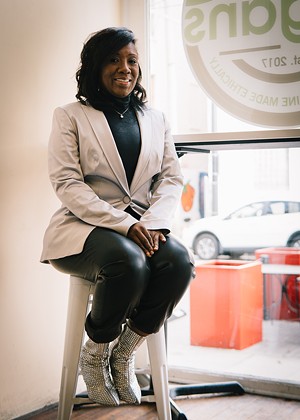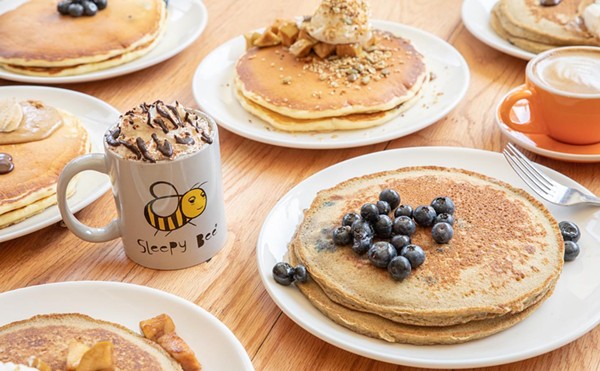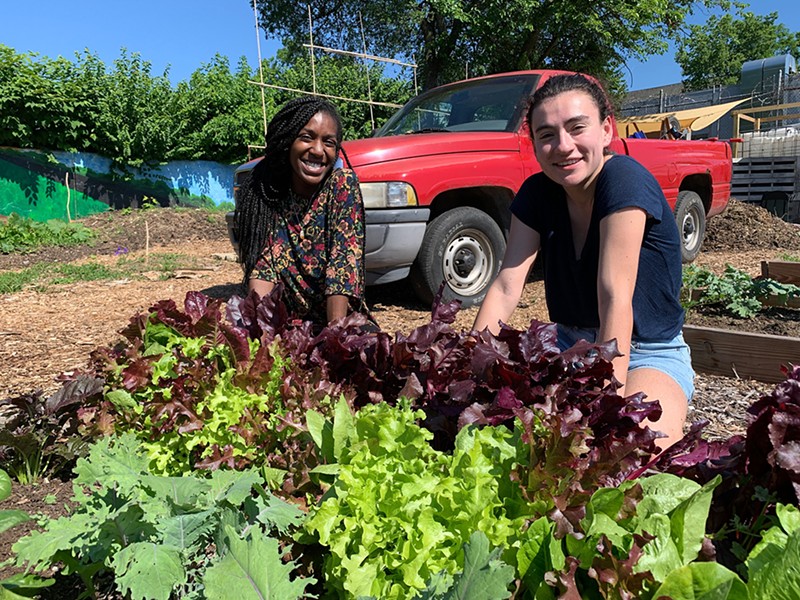
Editor's note: This story is featured in the Dec. 14 print edition of CityBeat.
Cincinnatians love their meat. There seems to be a Skyline Chili on nearly every street corner, there’s an entire festival dedicated to goetta, and residents celebrate Wing Week and Burger Week every year.
But more than just carnivores roam the concrete jungle. Nestled among the barbecue joints and fried-chicken dives, there’s a strongly-rooted community of plant-based eateries that’s thriving. From Essen Kitchen to Melt Revival to Allyn’s Café, more and more restaurants are whipping up meals suitable for vegans, vegetarians and omnivores.
And it’s nothing new. For decades, Cincinnati’s plant-based food scene has been nurtured into its current popularity, thanks to a cross-cultural focus on plant-based living.
But veganism or even basic healthy foods aren’t necessarily accessible to everyone in the Queen City, especially when entire neighborhoods are without grocery stores. And for many people who have been marginalized systemically, leaning into veganism has become a movement of resistance and reclamation.
A food revolution
Valerie Williams is the owner of Foodies Vegan, a Winton Hills family-run business that specializes in at-home vegan fare. But Williams was feeding Cincinnati plant-based fare long before that. In 1980, Williams opened Christos & Dravakis, a vegan eatery in Spring Grove Village.
“It’s not a fad; it’s not going away. This is a way of life, it’s here to stay,” Williams tells CityBeat. “And the thing that’s so cool is that it crosses all boundaries. It’s old people, young people, men, women, white people, Black people, Asian and Mexican people. There’s just a huge vegan and vegetarian movement and culture.”
In the United States, veganism as a concept largely has been whitewashed and often is linked to a “wellness” industry that promotes “mindfulness” and “healthy eating” through a white lens. The diet gained significant traction throughout the 2010s and beyond thanks to celebrities like Woody Harrelson and Billie Eilish.
But well before celebs made the decision to go plant-based, cultures with roots in Asia and Africa were centering their meals around vegetables, legumes, grains and herbs. Countries and communities have embraced the practice for centuries because of culture, ethics, conservation, politics or deeply held spirituality.
Dr. Francoise Knox Kazimierczuk, an assistant professor in the department of rehabilitation, exercise and nutrition sciences at the University of Cincinnati, is the co-professor of a class on Africana foodways.
“Meat [in African diets] is used sparingly [in Africa] so it’s a seasoning. It’s not something you’re basing your whole entire meal off of,” Kazimierczuk says.
Williams, 62, says she began her plant-based journey at 14 years old after getting her hands on a copy of Dick Gregory’s Natural Diet for Folks Who Eat: Cookin’ with Mother Nature, a popular 1974 guide by actor Dick Gregory. Gregory – a prominent Black activist from the mid-1950s up until his death in 2017 – believed that civil rights and animal rights go hand in hand, explaining in his 2000 memoir Callus on My Soul that humans and animals suffer and die in the same way.
“It was a perfect time,” says Williams about stumbling across Gregory’s book. “[Teenagers] get passionate. They’re like rebels without a cause.”
Williams says that after she finished Gregory’s book, she grabbed a garbage bag and trashed any food in her house that contained meat, dairy, food dyes or artificial flavorings.
Even as a teenager, Williams was struck by the health benefits of plant-based eating, she says, adding that later, she became very aware that cutting out meat was “the single most important thing” she could do for the environment.
Cementing her position as a pioneering vegan in Cincinnati, Williams later opened Christos & Dravakis during a time when she says most people didn’t know what the word vegan meant. Even vegetarian menu options were hard to come by in the ‘80s, let alone an entirely plant-based restaurant, she says.
Taking over an old Greek ice cream parlor’s space, Williams kept the original family name on the building – partly because it was etched in multiple places, but also because she didn’t want to bring a lot of attention to the fact that it was a vegan restaurant.
“We just thought that would maybe – especially in 1987 – that would scare a lot of people away,” Williams says.
Although Williams’ restaurant Christos & Dravakis is no longer open, it certainly made a name for itself back then. Williams tells CityBeat that jam band The Grateful Dead, Fred Rogers of Mr. Rogers’ Neighborhood and others passed through the doors of Christos & Dravakis, and a 1987 article from the Cincinnati Enquirer reported that Vegetarian Times magazine highlighted Williams’ establishment as one of the best vegetarian restaurants in the country. Christos & Dravakis “created a small revolution in the look and taste of meatless cooking,” the article said.
Unfortunately, Williams may have been too far ahead of what eventually would become a food trend in Cincinnati. She closed the restaurant in 1987 before vegetarianism and veganism reached their current popularity, moving to other pursuits. She continued to dabble in the plant-based food world, though, inviting herself into people’s kitchens in a different way by opening Foodies Vegan almost 20 years later.
Through Foodies Vegan, Williams has created a line of protein-rich vegan foods that she distributes locally through retailers such as Clifton Market and Rooted Juicery + Kitchen and nationally through larger stores, noting that the state of California and cities like Chicago and Boston are big fans.
The company’s most notable creation is a tofu-esque meat alternative called Pumfu. The original recipe is made from just pumpkin seeds and water, compressed into a loaf that can be fried, baked and used like meat would. Pumfu has a mild flavor that soaks up the spices, herbs and sauces that it’s cooked with, making it a tastier animal alternative than some other options. There are even flavored variations like Chorizo Crumble, Sloppy Joe and Sausage Crumble.
Meat substitutes like those can make gathering with others easier, especially when going meatless is an act of resistance. Naimah Sams, the communications and branding manager of Like Mom’s Only Vegan — a Black- and woman-owned vegan cookie shop in Over-the-Rhine — was brought up alongside her five siblings on a plant-based diet in Bond Hill.
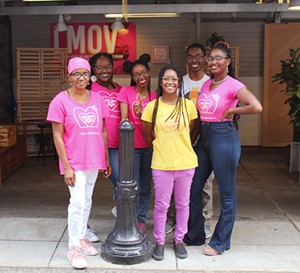
Sams, 26, says that for her parents Lamont and Naomi Sams, Black nationalism played a big role in their decision to go meatless and raise their family that way.
“It’s kind of revolutionary,” Sams says about being a Black vegan. “I kind of came up in a time where it was not normal to be a vegan person, especially not in the Black community.”
Growing up in the 1990s, Sams’ mother homeschooled her six children while keeping the refrigerator stocked with plant-based meals and food options – and she was just as skilled at whipping up desserts as she was oven-fried tofu, Sams says. Just because it’s vegan doesn’t automatically make it healthy, she points out.
Those years of cooking paid off. Sams’ mother and grandmother launched Like Mom’s Only Vegan in 2017 before proudly opening at Findlay Market on Juneteenth of 2020.
By using their decades of experience and plant-based recipe testing, Like Mom’s Only Vegan creates vegan cookies that fans say are just as good as the traditional ones. The shop carries cookie classics such as oatmeal raisin and peanut butter chocolate chip as well as memorable flavors like lemon cran-poppyseed and s’mores, which are packed with vegan marshmallows, chocolate chips and pecans.
Sams says that even though she wasn’t eating the same recipes as her peers and extended family while growing up, she didn’t feel like she was missing out.
“We had soul food,” Sams recalls. “We had cookouts – my family grilled vegan options. I had mac and cheese, potato salad and barbecue ‘chicken.’”
Soul food typically is comforting and packed with flavor, but traditional preparation often is not vegan-friendly. But Sams believes that the notion of soul food is more about culture than simply the ingredients that go into it – it’s also about gathering together.
“[Soul food] is something that has brought together Black people for such a long time, that has connected Black people to their early roots in this country – even early roots in the continent of origin,” Sams says. “Those connections, I think, is what makes it ‘soul.’”
“Food is communal. So if you went to the cookout, my mom would prepare something for us. And it may not be what [other people] were eating, but it was something vegan,” Sams continues. “And we were there, and we were all eating. [We] still felt that togetherness. All of that stuff still matters.”
Danielle DeLaine agrees. A seasoned entrepreneur, DeLaine launched her eatery Herban Vegans in 2017, adapting traditional soul food recipes that were cobbled together from discarded bits of food that slave owners didn’t view as nutritious or delicious.
“We’ve made delicacies out of scraps,” DeLaine tells CityBeat.
Those recipes have persisted for generations, passed from family member to family member, kitchen to kitchen, DeLaine says.
But DeLaine, 45, acknowledges that food scraps back in the day – which also often included pig intestines and knuckles – were in the garbage for many reasons, including sanitary and nutrition issues that can lead to health problems.
That concern continues today with fast food, with such restaurants found in low-income neighborhoods much more frequently than stores with fresh produce are. Due to decades of redlining and systemic racist practices, those neighborhoods often include large numbers of Black Americans, who in turn suffer higher rates of heart failure, diabetes and high blood pressure than their white counterparts, according to the Cleveland Clinic.
“It is detrimental to our health and also the generations thereafter,” DeLaine says. A lack of quality food options among the Black community is one of the many issues that propelled DeLaine into starting Herban Vegans, she says. It’s why DeLaine tries to make vegan eating more inclusive and accessible for everyone.
DeLaine has been fully vegan for six years, but her transition to the lifestyle didn’t happen overnight – it actually took 13 years. At age 20, DeLaine was diagnosed with an autoimmune disease. Despite what her doctors said, something inside DeLaine told her that food was the underlying cause, she says. Through researching, food journaling and eliminating certain foods, DeLaine’s health began to rebound, and she felt compelled to extend that knowledge to her family and to her community.
“I know the ailments that the Black community suffers from,” Delaine says, referencing the lack of resources and the financial barriers that prevent many people from being able to afford vegan or healthier fare.
Herban Vegans began as a food-service program. DeLaine says that when brainstorming names for her business, she was inspired by the plant-centric African diets that don’t use meat as the star of the show. DeLaine replaces those meats with enriched vegetables that are flavored with herbs and spices, using her expertise to craft vegan, pan-cultural dishes like po’ boy sandwiches and “gumbolaya,” an innovative marriage of gumbo and jambalaya.
DeLaine says that while concocting dishes like southern cabbage and sweet potato deep-dish pie, she works to invalidate the stereotype that soul food requires heavy, fatty foods. By putting a vegan spin on traditional soul food dishes, DeLaine hopes that she can convince others to “shift to a healthier way of eating and still not lose the taste, still not lose the tradition, still not lose the value of what we’re eating.”
Her community was receptive, she says. Soon after launching the Herban Vegans food service, DeLaine began receiving calls and questions about whether she could help people with certain health issues and diseases.
“I felt like people were crying out for help,” DeLaine says.
Completing the Findlay Launch storefront accelerator program in November, Herban Vegans is pivoting from a brick-and-mortar presence to catering, meal planning and cooking classes, along with community-based events and a monthly vegan supper club.
No matter the format, DeLaine says she continues to meet customers wherever they are in their plant-based journey, including crafting dishes for those on a specific vegan diet — like raw or alkaline vegans — as well as meals for those who are incorporating more plants into their omnivore diets.
Conquering food apartheid
For many people of a certain income level, the national, Amazon-owned Whole Foods is the place to go for plant-based and vegan groceries. The shelves there are crowded with things like vegan jerky, plant-based food coloring, nut milks, vegan cheese and fresh produce.
But not every community has a Whole Foods, or even a standard grocery store with budget-friendly vegan options. Depending on one’s location and access to transportation, stores with healthy foods can be hard to get to, especially when they’re in the Cincinnati suburbs.
Sams, the communications rep at Like Mom’s Only Vegan, says that as long as she’s lived in Bond Hill, there has never been a grocery store in the area.
“There are corner stores and gas stations. And we know what are in corner stores and gas stations,” Sams noted in her Cincy VegFest talk in June. “It’s not anything you can build a meal out of.”
For Sams and other residents of Bond Hill, there are three Kroger stores in areas surrounding the neighborhood. But by bus – which many Bond Hill residents rely upon – it can take up to two hours of travel and transfers to get there in addition to the time spent doing the actual shopping. For those working full-time jobs, raising kids or attending to other aspects of life, the task can be daunting.
A lack of big-box grocery stores isn’t just a Bond Hill issue – 270,000 households within Cincinnati suffer from food insecurity, according to Freestore Foodbank. For example, Avondale hasn’t seen a grocery store since the neighborhood Aldi closed its doors in 2008, and Walnut Hills’ CVS – which was a pharmacy that carried a few food items – closed in the fall.
The residents in these and other communities are in food deserts, which the Merriam-Webster dictionary defines as “an area in which little fresh produce is available for sale.” However, in Cincinnati, “food apartheid” may be much more fitting.
The word “desert” has the association of being naturally occurring, while the term “food apartheid” – a term that now is frequently used by activists – recognizes the systemic racism, oppression and discriminatory practices that play a role in creating the lack of grocery stores and fresh produce available in places such as Bond Hill. Like that neighborhood, Roselawn, Avondale, North Avondale and Walnut Hills are predominantly Black.
“If you know a Black vegan or a Black vegan business owner, it is likely that they’ve had to overcome [systemic food disparity, disproportionate health issues and cultural connections] to become Black and vegan,” Sams said in her Cincy VegFest talk.
Without easy access to fruits and vegetables, making the transition to a vegan diet – and sticking to it – is a much harder task.
“Veganism and that lifestyle choice perhaps is not a lifestyle choice afforded to low-income individuals if access to healthy foods is so challenging and unavailable from an affordability perspective,” Tevis Foreman, executive director of Produce Perks Midwest, tells CityBeat.
Produce Perks is a non-profit that works to bring local, farm-fresh fruits and vegetables to low-income families. Affordable access to produce is something that falls under the umbrella of basic human rights, Foreman says.
Produce Perks is available to those receiving SNAP and Pandemic EBT benefits, essentially doubling the purchasing power of those benefits through a $1-for-$1 match and allowing people to get fresh foods that they otherwise might not have the chance to buy. Benefits can be redeemed at various markets throughout the city. In 2021, Produce Perks served 28,140 households and provided more than 1.5 million servings of fruits and vegetables, according to the nonprofit’s 2021 impact report.
But residents also are taking matters into their own hands by getting down and dirty in community gardens and opening smaller grocery stores that offer produce, canned goods and other pantry staples.
Cincinnati is home to many community gardens scattered across the city. The Civic Garden Center of Greater Cincinnati’s website touts that its 75 community gardens and 50 school programs provide “neighborhood residents the opportunity to have direct access to the fresh, nutritious fruits and vegetables we all need.”
Gary Dangel, a longtime resident of Walnut Hills, says he made the decision to use his retirement to – along with neighbors – redevelop vacant lots into the neighborhood’s first community gardens.
In addition to being gathering hubs, the gardens also aid in the fight against food inaccessibility, he says.
“Community gardens demonstrate our ability to provide for ourselves when retailers are absent in our neighborhood,” Dangel tells CityBeat.
Dangel is now the food access coordinator of the Walnut Hills Redevelopment Foundation. As of press time, Walnut Hills is home to eight community gardens.
Dangel says residents are becoming more comfortable harvesting their own produce and herbs and that neighborhood schools like Frederick Douglass Elementary incorporate aspects of the garden into their classrooms.
But with constrictive growing seasons, unpredictable weather and pesky critters that hinder food production, the gardens can’t replace a neighborhood grocery store. And that means that veganism can be hard to adhere to.
That’s where a resurgence of mini markets comes in.
The Healthy Harvest Mobile Market is a grocery store on wheels that travels to food-insecure communities within Cincinnati. Each week, the Healthy Harvest Mobile Market makes stops in areas such as Avondale, Price Hill, Lincoln Heights and Bond Hill, providing fresh produce and other staples that otherwise would be hard to get without a big-box grocery store in the neighborhood.
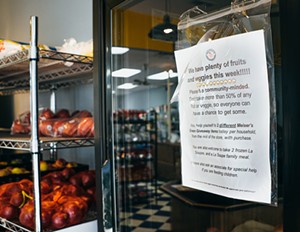
Meanwhile, in Lower Price Hill, Meiser’s opened in the 1940s as a family-owned grocery store. A longtime neighborhood staple and the go-to place for an after-school snack, the community was shaken when Meiser’s announced that the store would be closing in 2017. But through a community-fueled effort and resources from nonprofits and from the city itself, the store perseveres today as Meiser’s Fresh Grocery & Deli and provides the neighborhood with fresh produce as well as pantry and household staples.
In Avondale, the owners of The Country Meat Company, Tennel and Chanel Bryant, soon will open a grocery store within Avondale Town Center. Their plans call for fresh meats, local produce, wine tastings and meals to go. In a 2021 interview with WCPO-TV, Chanel Bryant noted the lack of places to get fresh items in Avondale.
“We want to break that cycle,” Chanel Bryant told WCPO.
And in Bond Hill, minority-owned organization Community Economic Advancement Initiatives recently broke ground on a project to revitalize the Bond Hill Market in April. The market will provide the neighborhood with fresh produce, meats and cheeses, along with hot meals prepared by culinary students.
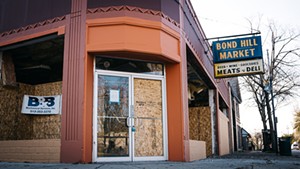
Communication and collaboration can make meaningful veganism accessible to more communities, DeLaine says.
“I believe that veganism [and] food consumption is a bridge,” DeLaine says. “Whenever you break bread with somebody and you sit down at the table, it spurs conversation. And I believe that the way that the world is right now that we need that communication more than ever.”
Coming soon: CityBeat Daily newsletter. We’ll send you a handful of interesting Cincinnati stories every morning. Subscribe now to not miss a thing.Follow us: Google News | NewsBreak | Reddit | Instagram | Facebook | Twitter

